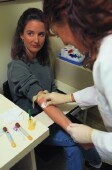
THURSDAY, Dec. 18, 2014 (HealthDay News) — In what scientists say is a first, a new analysis suggests that some blood types place women at a higher risk for developing type 2 diabetes.
How much higher? According to a team of French researchers, women with blood type B positive appear to face a 35 percent greater risk for developing type 2 diabetes than women with blood type O negative.
However, experts questioned the value of the findings when so many other risk factors for the blood sugar disease can be countered with lifestyle changes.
At play in the study was the basic principal that, as the American Red Cross notes, “not all blood is alike.”
Type A blood, for example, carries the A antigen on its surface, sparking a specific immune response whenever foreign substances enter the body. Type B blood carries the B antigen, while type AB carries both, and type O carries neither.
An additional variable, known as the Rhesus (Rh) factor, further distinguishes one person’s blood from another’s as Rh positive or negative. The result is eight distinct blood types: O positive, O negative, A positive, A negative, B positive, B negative, AB positive and AB negative.
Because accurately matching blood types can prove critical (particularly in the case of blood transfusions), identifying blood type is commonplace.
But screening blood type for diabetes risk is not.
Enter a team led by Guy Fagherazzi, of the Centre for Research in Epidemiology and Population Health at the Gustave Roussy Institute in Villejuif, France. The researchers set out to analyze data on more than 82,000 French women. All the women were tracked from 1990 to 2008.
In the Dec. 18 issue of the journal Diabetologia, Fagherazzi and his colleagues report that women with type A blood ended up with a 10 percent higher overall risk for diabetes than women with type O blood. Those with type B blood faced a more than 20 percent greater risk, while the risk profile of the AB blood type proved inconclusive.
Looking at just the Rh factor, the team found that diabetes risk was the same whether or a not a woman was Rh positive or Rh negative.
Then, the authors combined blood types with Rh factors.
The result: relative to women with O negative blood, diabetes risk was 17 percent greater among A positive women, 22 percent higher among A negative women, 26 percent greater among AB positive women, and 35 percent higher among B positive women.
As to whether the finding might apply to men, the authors suggested in their study that it’s likely it would, since nothing in the finding appeared to be gender-specific.
They also suggested that the impact of blood type on diabetes risk may play out on a number of levels, including inflammation, molecular structure, the microbial composition of the gut and metabolic activity.
Fagherazzi stressed in the study that the exact nature of the blood type-diabetes association will remain unclear until further study.
But Dr. Robert Ratner, chief scientific and medical officer at the American Diabetes Association, questioned the value of the finding.
“This is a highly problematic paper,” he said. “And I’m really not sure it sheds any light on the subject. Over an 18-year period they were only able to identify about 3,500 cases of diabetes out of 82,000 women. That figure is so low, compared with what we know about diabetes here and in France, that it basically means they didn’t really identify people with diabetes. And that means that all of their statistics are highly doubtful.”
“So, I would say this is a poor paper with very faulty data, about which I would draw no conclusions,” Ratner said. “It doesn’t teach us anything. And we are certainly not going to screen for diabetes based on blood type. We have far better ways of identifying risk.”
Dr. John Buse, director of the Diabetes Care Center at the University of North Carolina at Chapel Hill, seconded the thought.
“The important thing for people to know is that diabetes is a very common illness,” he said. “And there are lots of risk factors that we can do something about. If you’re overweight, you can lose weight. If you’re sedentary, you can become more active. If you smoke, you can stop. Blood type is not a risk marker that anyone can do anything about, and we’re not going to screen for it.”
The French researchers did not respond to requests for comment on the study.
More information
Visit the American Diabetes Association for more on risk factors for this blood sugar disease.
Copyright © 2026 HealthDay. All rights reserved.

